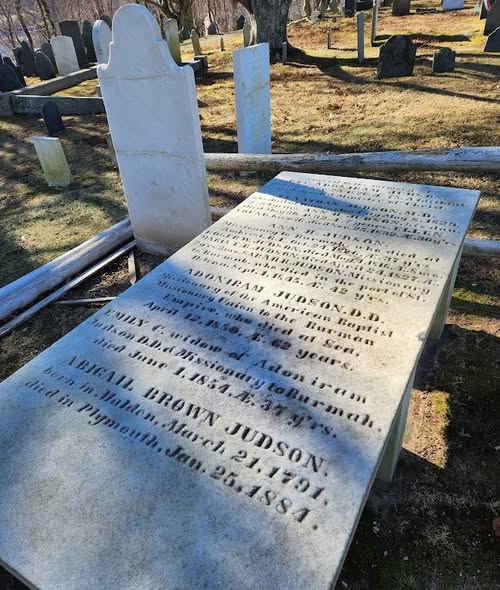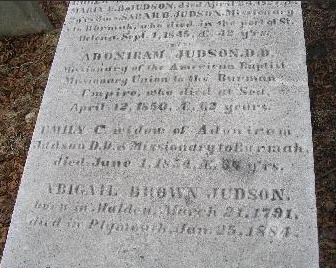Before you leave Plymouth, head on up to Burial Hill. It’s a steep climb, but there are steps.
Inside a white fence is not a grave, but a cenotaph, “a monument to someone buried elsewhere.” Adoniram Judson was the son of a Congregational minister in Plymouth, but he fell in with the wrong friends. While at Brown University, he was befriended by Jacob Eames, who led Judson away from his faith. Judson later stopped at an inn to spend the night, only to be awakened by the dying screams of a terrified man. As he departed the next morning, he found out those were the screams of the infidel Jacob Eames.
Terrified by the result of his friend’s choices, Judson returned to the faith, enrolled in Andover Seminary, and joined the Brethren who were preparing for missionary service.
Judson married Ann Hasseltine, left for India, on the voyage discovered that he was a Baptist, was re-baptized by William Carey, sent his friend Luther Rice back to the States to raise support from the Baptist churches, and continued on to Burma.
Suffering imprisonment, illness, the loss of two wives, the death of several children, Judson suffered as few ever have. Yet he was able to translate the Bible into Burmese, start over 100 churches, and see over 8,000 of the Burmese become Christians. Today the Myanmar Baptist Convention has approximately 1 million members.
Upon reading of his son’s Christian Baptism, in 1817, Adoniram Judson Sr., of the Church of the Pilgrimage, on the north side of Town Square, became a Baptist and resigned the Congregational pastorate. After serving for most of his life in Burma, Judson Jr, died at sea. There is a cenotaph to his honor on Burial Hill.
copyrighted and used by permission from David Beale, Baptist History in England and America: Personalities, Positions, and Practices
From Wikipedia:
Judson was born on August 9, 1788, in Malden, Middlesex County, Massachusetts. He was born to Adoniram Judson, Sr., a Congregational minister, and Abigail (née Brown). Judson entered the College of Rhode Island & Providence Plantations (now Brown University) when he was sixteen, and graduated as valedictorian of his class at the age of nineteen. While studying at college, he met a young man named Jacob Eames, a devout deist and skeptic. Judson and Eames developed a strong friendship, leading to Judson’s abandonment of his childhood faith and parents’ religious instruction. During this time, Judson embraced the writings of the French philosophes. After graduating from college, Judson opened a school and wrote an English grammar and mathematics textbook for girls.
Judson’s deist views were shaken when his friend Eames fell violently ill and died. Both had been sleeping in separate rooms at an inn, and Judson heard the death throes of the person next door, only to learn from the clerk the next morning that his anonymous neighbor had been Mr. Eames, who had indeed died. The shock of learning the dying neighbor’s identity – and that Eames had led Judson away from the Christian faith into skepticism, but was now dead – returned Judson back to the faith of his youth, although he was already attending the Andover Theological Seminary. In 1808, Judson “made a solemn dedication of himself to God”.[1] During his final year at the school, Judson decided upon a missionary career.
In 1810, Judson joined a group of mission-minded students who called themselves “the Brethren”. The students inspired the establishment of America’s first organized missionary society.[2][better source needed] Eager to serve abroad, Judson became convinced that “Asia with its idolatrous myriads, was the most important field in the world for missionary effort”. He, and three other students from the seminary, appeared before the Congregationalists’ General Association to appeal for support. In 1810, impressed by the four men’s politeness and sincerity, the elders voted to form the American Board of Commissioners for Foreign Missions.
When Judson began his mission in Burma, he set a goal of translating the Bible and founding a church of 100 members before his death. By the time of his death, he had accomplished those goals and more: leaving the translated Bible as well as a half-completed Burmese-English dictionary (discussed below), 100 churches, and over 8,000 believers. In large part due to his influence, Myanmar has the third largest number of Baptists worldwide, behind the United States and India. The majority of adherents are Karen and Kachin.
Judson compiled the first ever Burmese-English dictionary, missionary E. A. Steven completed the English-Burmese half. Every dictionary and grammar written in Burma in the last two centuries has been based on ones originally created by Judson. Judson “became a symbol of the preeminence of Bible translation for” Protestant missionaries.[5] In the 1950s, Burma’s Buddhist prime minister U Nu told the Burma Christian Council “Oh no, a new translation is not necessary. Judson’s captures the language and idiom of Burmese perfectly and is very clear and understandable.”[6] Though the Bible has been translated numerous times into Burmese, Judson’s translation remains the most popular version in Myanmar.[citation needed]
Each July, Baptist churches in Myanmar celebrate “Judson Day,” commemorating his arrival as a missionary. Inside the campus of Yangon University is Judson Church, named in his honor, and in 1920 Judson College, named in his honor, merged into Rangoon College, which has since been renamed Yangon University.[6] The American University named in his honor, Judson University was founded in Elgin, Illinois, in 1963, as the liberal arts Judson College was separated from the Northern Baptist Theological Seminary, which moved from Chicago to Lombard, Illinois. This American Judson College became Judson University in 2007 and now also has a campus in Rockford, Illinois.
Judson’s change to the validity of believer’s baptism, and subsequent need of support, led to the founding of the first national Baptist organization in the United States and subsequently to all American Baptist associations, including the Southern Baptists that were the first to break off from the national organization. Publication of his wife Ann’s letters about their mission inspired many Americans to become or support Christian missionaries. At least 36 Baptist churches in the United States are named after Judson, as well as the town of Judsonia, Arkansas. Judson College in Alabama is named after his wife Ann and a dormitory at Maranatha Baptist University carries his name to inspire young ministers.[6] Christian Union owns and operates a ministry center named after him at his undergraduate alma mater, Brown University. His seminary alma mater, Andover Theological Seminary, (now Andover Newton Theological School), named their prestigious annual award as The Judson Award.
_____
Image Source/Credit (in order):
- “These People Called Baptist | Adoniram Judson, Jr | Facebook.” Facebook Groups, www.facebook.com/groups/504337620143213/posts/1550549268855371.
-
“These People Called Baptist | Adoniram Judson, Jr | Facebook.” Facebook Groups, www.facebook.com/groups/504337620143213/posts/1550549268855371.
Related
Sorry, no records were found. Please adjust your search criteria and try again.
Sorry, unable to load the Maps API.

